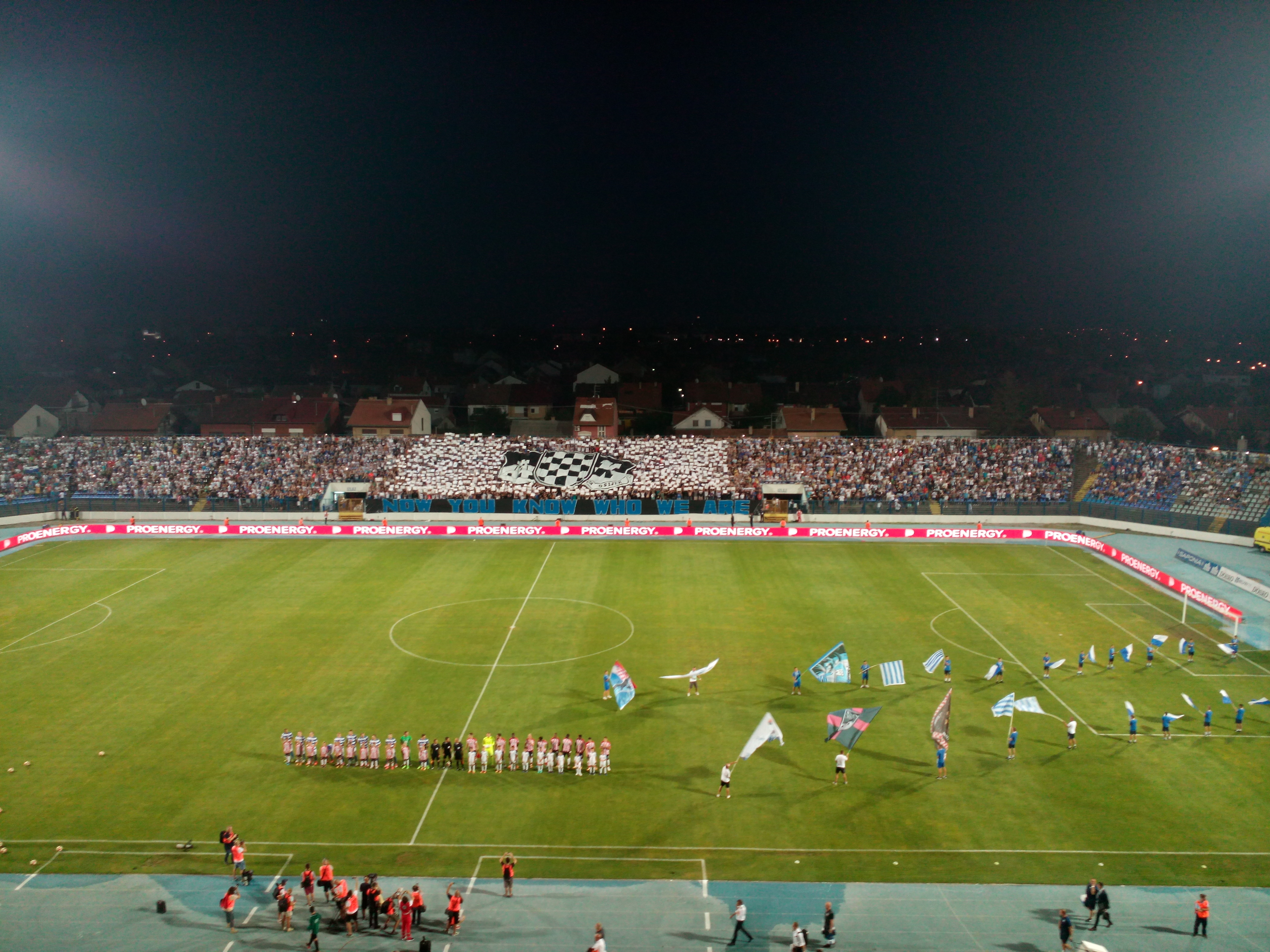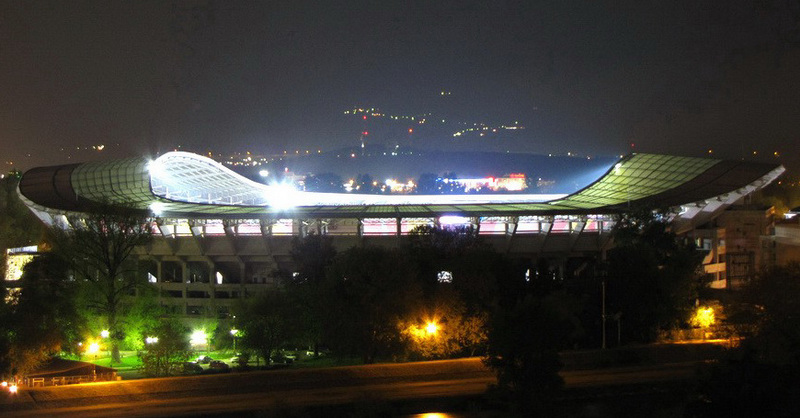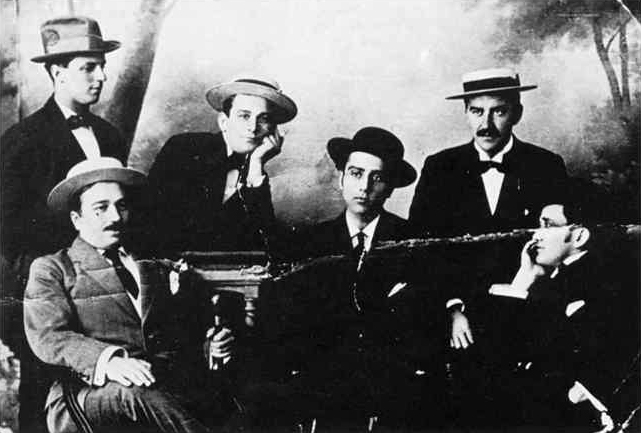|
1982–83 Yugoslav Cup
The 1982–83 Yugoslav Cup was the 35th season of the top football knockout competition in SFR Yugoslavia, the Yugoslav Cup ( sh, Kup Jugoslavije), also known as the "Marshal Tito Cup" (''Kup Maršala Tita''), since its establishment in 1946. The 1981–82 winners Red Star failed to retain the trophy as they were knocked out in the second round by Rijeka. Previous season's runners-up Dinamo Zagreb and Sarajevo reached the tournament final, in which Dinamo won their 7th cup title by beating Sarajevo 3–2 through goals by Zlatko Kranjčar and Snješko Cerin. This was their second major silverware won under the guidance of Miroslav Blažević, with whom they previously won the 1981–82 Yugoslav First League championship, their first league title in 24 years. Surprise of the tournament were the Rijeka-based minnows Orijent who managed to reach the quarter-finals, where they were knocked on penalties after holding the eventual runners-up Sarajevo to a 0–0 draw. Calendar The Yug ... [...More Info...] [...Related Items...] OR: [Wikipedia] [Google] [Baidu] |
Socialist Federal Republic Of Yugoslavia
The Socialist Federal Republic of Yugoslavia, commonly referred to as SFR Yugoslavia or simply as Yugoslavia, was a country in Central and Southeast Europe. It emerged in 1945, following World War II, and lasted until 1992, with the breakup of Yugoslavia occurring as a consequence of the Yugoslav Wars. Spanning an area of in the Balkans, Yugoslavia was bordered by the Adriatic Sea and Italy to the west, by Austria and Hungary to the north, by Bulgaria and Romania to the east, and by Albania and Greece to the south. It was a one-party socialist state and federation governed by the League of Communists of Yugoslavia, and had six constituent republics: Bosnia and Herzegovina, Croatia, Macedonia, Montenegro, Serbia, and Slovenia. Within Serbia was the Yugoslav capital city of Belgrade as well as two autonomous Yugoslav provinces: Kosovo and Vojvodina. The SFR Yugoslavia traces its origins to 26 November 1942, when the Anti-Fascist Council for the National Liberation of Yugoslavia wa ... [...More Info...] [...Related Items...] OR: [Wikipedia] [Google] [Baidu] |
Yugoslav People's Army
The Yugoslav People's Army (abbreviated as JNA/; Macedonian and sr-Cyrl-Latn, Југословенска народна армија, Jugoslovenska narodna armija; Croatian and bs, Jugoslavenska narodna armija; sl, Jugoslovanska ljudska armada, JLA), also called the Yugoslav National Army, was the military of the Socialist Federal Republic of Yugoslavia and its antecedents from 1945 to 1992. Origins The origins of the JNA started during the Yugoslav Partisans of World War II. As a predecessor of the JNA, the People's Liberation Army of Yugoslavia (NOVJ) was formed as a part of the anti-fascist People's Liberation War of Yugoslavia in the Bosnian town of Rudo on 22 December 1941. After the Yugoslav Partisans liberated the country from the Axis Powers, that date was officially celebrated as the "Day of the Army" in the Socialist Federal Republic of Yugoslavia (SFR Yugoslavia). In March 1945, the NOVJ was renamed the "Yugoslav Army" ("''Jugoslavenska/Jugoslovenska Armija' ... [...More Info...] [...Related Items...] OR: [Wikipedia] [Google] [Baidu] |
FK Leotar
FK Leotar ( sr-cyrl, ФК Леотар), commonly known as Leotar Trebinje or simply Leotar, is a professional football club based in the city of Trebinje that is situated in southern Bosnia and Herzegovina. Founded in 1925 and named after the mountain located just north of the city, the club's home ground is the 8,550-seater Stadion Police. They currently play in the Premier League of Bosnia and Herzegovina, the first-tier competition in Bosnia and Herzegovina. Founded in 1925, Leotar was a member of the First League of the Republika Srpska after the 1992–95 Bosnian War, winning its final season before integration in the 2001–02 season. In its first season in the Premier League of Bosnia and Herzegovina, Leotar won its only national championship and qualified for the UEFA Champions League. History Yugoslavia Founded in 1925 in the Kingdom of Serbs, Croats and Slovenes, the club served as a training ground for many players who went on to enjoy notable careers elsewhere. Leot ... [...More Info...] [...Related Items...] OR: [Wikipedia] [Google] [Baidu] |
FK Partizan
Fudbalski klub Partizan ( sr-Cyrl, Фудбалски клуб Партизан, ; en, Partizan Football Club), sometimes known as Partizan Belgrade in English, is a Serbia, Serbian professional football club (association football), football club based in Belgrade, Serbia, Belgrade. It forms a major part of the JSD Partizan, Partizan multi-sport club. The club plays in the Serbian SuperLiga and has spent its entire history in the top tier of Yugoslav and Serbian football having won a total of 45 official trophies, finishing in the Yugoslav First League, Yugoslav league all-time table as second. Their home ground is the Partizan Stadium in Belgrade, Serbia, Belgrade, where they have played since 1949. Partizan holds records such as playing in the first UEFA Champions League, European Champions Cup match on 4 September, 1955–56 European Cup, 1955, as well as becoming the first Balkans, Balkan and Eastern European football club to reach the European Champions Cup final, when it ... [...More Info...] [...Related Items...] OR: [Wikipedia] [Google] [Baidu] |
NK Osijek
Nogometni klub Osijek ( en, Osijek Football Club), commonly referred to as NK Osijek or simply Osijek (), is a Croatian professional football club from Osijek. Founded in 1947, it was the club from Slavonia with the most seasons in the Yugoslav First League and, after the independence of Croatia in 1992, it is one of the four clubs that have never been relegated from the Croatian First League, the others being Dinamo Zagreb, Hajduk Split and Rijeka. History 1947–1976 The precursor to NK Osijek was founded on 27 February 1945 as NK Udarnik on the tradition of banned JŠK Slavija Osijek, which was founded in 1916 and played in the first jugoslav league 7 times between 1923 and 1941. Already in 1946, the club is merged with Jedinstvo, and changes its name to NK Slavonija. The conventional birthday of the club is considered to be the following year on the February 27, 1947, when NK Slavonija and Nk Bratstvo merge to form the FK Proleter. The first match played under that name come ... [...More Info...] [...Related Items...] OR: [Wikipedia] [Google] [Baidu] |
FK Vardar
FK Vardar Skopje ( mk, ФК Вардар Скопје), or simply Vardar, is a football club based in the capital city of Skopje, North Macedonia, North Macedonia. The club was founded in 1947 and currently competes in the Macedonian Second Football League. They are the most successful club in Macedonian football, having won eleven Macedonian First Football League, Macedonian First League titles, five Macedonian Football Cup, Macedonian Cups, two Macedonian Football Supercup, Macedonian Super Cups, and one Yugoslav Cup. In 2017, they became the first Macedonian club to qualify for European competitions. History Beginning After WW2 FK Vardar was established with the merger of city rivals Pobeda Skopje, FK Pobeda(1919) and Gragjanski Skopje, FK Makedonija(1922), in the hall of cinema "Vardar" on 22 July 1947. The foundation assembly had decided the club's color to be blue and it was, but already at the next assembly the decision was changed to red and white. FK Pobeda has compete ... [...More Info...] [...Related Items...] OR: [Wikipedia] [Google] [Baidu] |
FK Jedinstvo Bijelo Polje
Fudbalski klub Jedinstvo ( Montenegrin: Фудбалски клуб Јединство) is football club from Bijelo Polje, Montenegro, currently competing in the Montenegrin First League. The club was established in 1922. History FK Jedinstvo (''FC United'') was founded in 1922, as a first football team in Bijelo Polje. During the first two decades (1922-1941), the team played mostly exhibition matches, without participation in Montenegrin Football Championship. First significant success after World War II, the team made on season 1949-50, with promotion to the Montenegrin Republic League. At that time, the club played under the name ''Bratstvo''. Soon after that, in the 1955-56 season, FK Jedinstvo played their first-ever season in the Yugoslav Second League, but were relegated after three consecutive seasons. Most of the sixties, FK Jedinstvo spent in Republic League, until the 1967-68 season. On that year, the team finished third place and gained promotion to the Yugoslav ... [...More Info...] [...Related Items...] OR: [Wikipedia] [Google] [Baidu] |
HNK Hajduk Split
Hrvatski nogometni klub Hajduk Split, commonly referred to as Hajduk Split () or simply Hajduk, is a Croatian professional football club based in Split, that competes in the Croatian First League, the top tier in Croatian football. Since 1979, the club's home ground has been the 34,198-seater Stadion Poljud. The team's traditional home colours are white shirts with blue shorts and blue socks. The idea to form a football club was started by group of Split students who were studying in Prague. After observing a game between Slavia and Sparta Prague, the group gathered at the U Fleků tavern and talked of creating a football club at home. When they returned to Split, they put their plan in motion and Hajduk was founded on 13 February 1911. Between the early 1920s and 1940, Hajduk regularly participated in the Kingdom of Yugoslavia national championship. Following World War II and the formation of the Yugoslav league system in 1946, Hajduk went on to spend the entire SFR Yugoslavia ... [...More Info...] [...Related Items...] OR: [Wikipedia] [Google] [Baidu] |
Penalty Shootout (association Football)
A penalty shoot-out (officially kicks from the penalty mark) is a tie-breaking method in association football to determine which team is awarded victory in a match that cannot end in a draw, when the score is tied after the normal time as well as extra time (if used) have expired. In a penalty shoot-out, each team takes turns shooting at goal from the penalty mark, with the goal defended only by the opposing team's goalkeeper. Each team has five shots which must be taken by different kickers; the team that makes more successful kicks is declared the victor. Shoot-outs finish as soon as one team has an insurmountable lead. If scores are level after five pairs of shots, the shootout progresses into additional " sudden-death" rounds. Balls successfully kicked into the goal during a shoot-out do not count as goals for the individual kickers or the team, and are tallied separately from the goals scored during normal play (including extra time, if any). Although the procedure for each ... [...More Info...] [...Related Items...] OR: [Wikipedia] [Google] [Baidu] |
Raška, Serbia
Raška ( sr-cyr, Рашка, ) is a town and municipality located in the Raška District of southwestern Serbia. The municipality has a population of 24,680 people, while the town has a population of 6,574 people (2011 census). It covers an area of 670 km2 (259 sq. mi.). The town is situated on the rivers Raška and Ibar. History The town and municipality bears the name of the historical Raška region. From 1929 to 1941, Raška was part of the Zeta Banovina of the Kingdom of Yugoslavia. Demographics According to the 2011 census results, the municipality of Raška has 24,678 inhabitants. Ethnic groups The ethnic composition of the municipality: Economy The following table gives a preview of total number of registered people employed in legal entities per their core activity (as of 2018): Gallery File:Centar Raške2.jpg, ''Town center square'' File:Centar Raške1.jpg, ''Town center square'' File:29.09.13 Raška 711.005 (10101184823).jpg, ''Train station in Raška'' F ... [...More Info...] [...Related Items...] OR: [Wikipedia] [Google] [Baidu] |
OFK Belgrade
OFK Beograd ( sr-Cyrl, ОФК Београд – Омладински фудбалски клуб Београд, English: ''Belgrade Youth Football Club'') is a Serbian professional football club based in Belgrade, more precisely in Karaburma, an urban neighborhood of the municipality of Palilula. It is part of the OSD Beograd sport society. All up, the club has won 5 national championships, in the following seasons: 1930–31, 1932–33, 1934–35, 1935–36, and 1938–39; the club won these titles under their old name of BSK (Beogradski Sport Klub). The club has been cup winners five times also, winning in the following seasons: 1934, 1953, 1955, 1961–62, and 1965–66. The club has also recorded significant results in European competition, reaching the 1962–63 European Cup Winners' Cup semi-finals where they lost to Tottenham Hotspur. They reached the 1972–73 UEFA Cup quarter-finals where they lost to FC Twente. History The beginning The club was founded in 1945 ... [...More Info...] [...Related Items...] OR: [Wikipedia] [Google] [Baidu] |
FC Prishtina
Football Club Prishtina ( sq, Klubi Futbollistik Prishtina, ; sr, Фудбалски клуб Приштина, Fudbalski klub Priština), commonly known as Prishtina, is a professional football club based in Prishtina, Kosovo. The club play in the Football Superleague of Kosovo, and is the most successful club in Kosovo. The club is also the only club in Kosovo to have never have been relegated from the league. History The club was founded in 1922 under the name Kosova. Later on their name changed to Proleter, Jedinstvo, Kosova and finally Prishtina. 1922–1926: Beginnings of FC Prishtina (Futboll Klub Kosova) Football in Kosovo has been played and developed since 1919, shortly after the end of the First World War. Many demobilized soldiers and officers, as well as students studying at universities in France, Switzerland, Italy, Austria, England, Bucharest, Budapest, and elsewhere, began to return to their home countries. Thus, a student of Samerslen College Grenoble (Franc ... [...More Info...] [...Related Items...] OR: [Wikipedia] [Google] [Baidu] |




